Daily Report by GM Alexander Baburin from Turkey
Day One, 28th October 2000
 While in Istanbul GM Baburin began publishing Chess Today, a daily chess newspaper. Check it out!
While in Istanbul GM Baburin began publishing Chess Today, a daily chess newspaper. Check it out!
A mosque at nightDay One, 28th October 2000. Today the 34th Chess Olympiad started. So far the event is very well run. I would compare it very favourably with Moscow-94 and Yerevan-96 in terms of organisation, judging by the first two days. When I arrived to Istanbul airport around midnight last night, I quickly saw people meeting chess players. The transfer to my hotel was swift and the hotel itself made a good impression on me. It’s called ‘Green Park’ (where else would you expect the Irish teams to stay? It must be something green!) and it seems like a genuine 3-star hotel. OK, they claim 4 stars, but… Our team stays in the same hotel with the Dutch, Armenian and some other delegations. There are a few other hotels nearby, where other teams stay. This is great as you can easily meet with your friends. After all, Chess Olympiads are great festivals and the social element plays a great role at them, particularly for those teams, which are not fighting for medals. OK, after the first round, when we beat Panama 4-0, the Irish men’s team is still fighting for medals though! 🙂 In round Two (on Sunday) we play against Cuba. The Irish men’s team consists of: GM Alexander Baburin, IM Mark Quinn, IM Mark Heidenfeld, FM Colm Daly, IM Mark Orr and Sam Collins. Our women’s team is: 1. Susan Connolly 2 Mairead O’Siochru 3 Deborah Quinn 4 Elizabeth Shaughnessy.
The playing venue is just 15 minutes walk from our hotel. Itâs a big exhibition centre and seems to suit the Olympiad just fine. All teams (men and women) play in the same hall, which makes it easy to follow the matches. I am just afraid the hall will quickly get stuffy, but this is hard to avoid with a few thousand people gathering together. By the way, this Olympiad has a record number of entries – 129 countries are playing in men’s competition. This is really great!
The opening ceremony was good and not too long. The first round started about 40 mites late, but this is understandable for such a huge event. The rate of play is 1 hour 40 minutes for 40 moves, with a 30-seconds increment per move. Then it’s 50 minutes per 20 moves with increment, etc. All games are played on special electronic boards, so all of them are shown live on the Net! Alas, these sensitive electronic boards are still easy to confuse and they often show impossible move.
2 GMs on a bridgeI did not play in round one, so after hanging around for a while and saying ‘Hello!’ to lots of people, I went to the city with my old friend Lev Psakhis. Istanbul looks like a very dynamic city, with a typical eastern charm. I hope to see more of it during 2 free days, which we will have here. They certainly have some impressive mosques here! People here look very friendly.

At left: GM Psakhis and GM Baburin (Photo by GM Baburin) (Photos courtesy Mark Orr)
Russia is the top seed in men’s event. Even without Kasparov, Kramnik (or should we put their names in a different order now?!), Bareev and Karpov, it is still a great team: Khalifman, Morozevich, Svidler, Rublevsky, Sakaev and Grischuk. Watch out for Grischuk – this 17-year old player is capable of delivering great results! England looks very good too – with Adams, Short, Hodgson, Speelman, Miles and Emms. Then we have Israel (Gelfand, Smirin et al), Ukraine (Ivanchuk, Ponomariov et al) and Hungary (Leko, Judith Polgar, Almasi et al). The US team is seeded 7th, but Americans are always very good at team events, so no doubt they will be fighting for medals.
There were already a few surprises today. The biggest is that USA dropped 1.5 points to Turkey (Nick de Firmian lost). England and Netherlands dropped half of point each and there are probably some other top teams, which did not manage to score 100% in the first round. I would expect more surprises today, so stay tuned!
Day Two, 29th October 2000
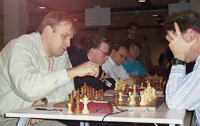
Cuba-Ireland GM Baburin on left, GM Vera on right.
In my previous report I praised the organisation of the Olympiad, but now I want to take some of that back. Actually, it has little to do with the Turkish side and more to do with FIDE, as the arbiters delayed the second round was by 25 minutes. We actually started on time (well, almost!), but 2 minutes later the chief arbiter asked everyone to stop, because those sophisticated electronic boards somehow did not start recording moves at the same time (somebody forgot to plug them in?!). At that moment some players had played good few moves. For example, I had the position after 1 d4 d5 2 c4 dxc4 3 e3 e6 4 Bxc4 c5 5 Nf3. I told my opponent (GM Vera from Cuba) that I would not repeat this line when we resume play as I want something sharper now! 🙂 So, is it time to amend the FIDE rules and include such a thing as false-start?!
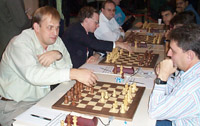
Cuba-Ireland GM Baburin on left, GM Vera on right.
Round 2 saw some tough clashes. For example, all games in the match Denmark-Netherlands were drawn. Finland beat Byelorussia 2¸-1¸ and England dropped a point to Costa Rica (Julian Hodgson lost). This result could be even worse, but Michael Adams managed to win an inferior rook ending. Hungary beat Burma 4-0 and is probably the only team on perfect score. Today they will probably play Russia, which beat Italy 3¸-¸ (Grischuk drew against Belotti). Our team lost to Cuba 1¸-2¸ (Mark Heidenfeld lost on board 3). Today we are facing an even more powerful team – Byelorussia. Our lady’s team is not doing well, having lost both matches 0-3. But hopefully they will start winning now.
My game against GM Vera saw a curious ending:
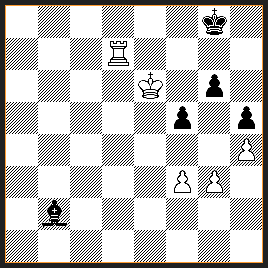 Vera-Baburin
Vera-Baburin
I knew that my position was lost and I knew how. Fortunately, my opponent knew only the assessment, but not the exact plan. During the game he failed to work it out and went for the wrong idea. He eventually played g3-g4. At some point we got the following position:
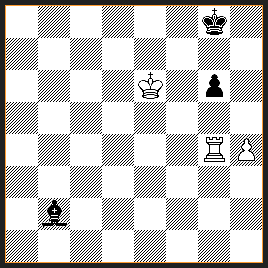 I played 83…Kh7 and after 84 Kf7 Kh6 85 Rg5 Be1 86 Rxg6+ Kh5 87 Kf6 Kxh4 we soon agreed a draw. Lucky escape for me!
I played 83…Kh7 and after 84 Kf7 Kh6 85 Rg5 Be1 86 Rxg6+ Kh5 87 Kf6 Kxh4 we soon agreed a draw. Lucky escape for me!
In the position on our first diagram White should follow the following plan: play f3-f4 and then g3-g4!. Then after …fxg4 he has f4-f5, while after …hxg4 White breaks in with h4-h5 gxh5, Kxf5.
More news tomorrow – stay tuned!
Day Three, 30th October 2000.
The Olympiad is gathering momentum – three rounds have been played already. Today Hungary beat Russia and leads the event with 10¸, sharing the lead with Germany, which beat Moldova 3-1. In round 4 Germany and Hungary meet. In the match against Russia Leko beat Khalifman (with White), while games Morozevich-Almasi, Polgar-Svidler and Rublevsky-Sax were drawn. A disappointing result for Russia, which again finds itself lagging behind the leaders. But the Russian team has a good history of catching up, so it is too early to say though which teams will be main contenders for the gold medals. England beat India 2¸-1¸, USA beat Latvia 2¸-1¸, while Slovakia beat powerful Armenian team with the same score.
The Irish teams did well today: ladies drew 1¸-1¸ against Syria, while our men’s team drew 2-2 against Byelorussia. That team is seeded 18th, while we are 53th, so it was a good result. I won with Black against Alexey Fedorov (2648) in a very interesting game, where my beloved Alekhine Defence stood well against the Four Pawns Attack. (See game with notes in Game Viewer.) On board 4 Mark Orr won a very good game against 2420-player. Tomorrow we will play against Yugoslavia.
Before the round each player was given an instruction what to do before the game in order not to upset the electronic boards. Here is an extract of that wonderful document signed by Emmanuel Omuku: “Players … are not to touch or adjust the pieces under any circumstances, until the clocks have been started…”. We are already not supposed to put the pieces back after the game is finished and now we have another inconvenience. I am not sure that the pleasure of having all games on the Net live is is worth the trouble. Besides, those electronic boards show the game with lots of mistakes anyway. But if FIDE Commerce PLC will tell us not to touch pieces before the game, we should obey, of course. And if in the future they will tell us not to touch pieces at all, so let it be! 🙂 By the way, I heard that the FIDE Congress, which will start here in a few days, has a pretty good agenda – transfer of FIDE powers to FIDE Commerce PLC. I already expressed my dislike of this idea, when an international sports organisation with a long tradition gets taken over by a for-profit company. I think it will be bad for chess…
Another little organising incident happened during the 3rd round at about 17-45. Suddenly the lights went down. Not all of them, so it was possible to see the boards, but it was inappropriate to continue playing. So the clocks were stopped. However, many players stayed at their boards and continued to look at the positions. I think that this is wrong and that the arbiters should have instructed all players to get up and move away from their boards.
I got to see Istanbul a bit more. Near our hotel there is a big square with a pedestrian street beginning there. Both the square and the street are radiant, with lots of people walking till late night. The weather is good – rather warm and sunny. To me it seems that Istanbul has the highest number of taxis in the world – they are just everywhere! Hopefully we will get to see more of Istanbul on Friday, which is free day here.
More to follow – come back later!
Day Four, 31st October 2000.
After 4 rounds at the men’s Olympiad Germany and Israel are in the lead. Germans beat Hungary 3-1, winning on boards 3 and 4 (Lutz-Polgar 1-0; Portisch-Luther 0-1). Israel beat Cuba with the same score. Russia managed the same result against France although it looked that the score could be even higher as Khalifman failed to convert his considerable advantage. In the match Netherlands-England all games were drawn. Tomorrow Germany will play Israel, while Russia meats with Brazil. Although the Brazilians will be the underdogs in this match, this young team is capable of delivering surprises, as earlier they crashed a strong team from Slovakia.
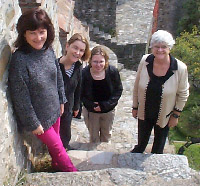
The Irish Women’s Team
In the women’s event Georgia beat Russia 2¸-¸, which is a great result for the Georgian team. Both Irish teams had a pretty miserable day: our ladies lost ¸-2¸ to New Zealand, while our men’s team lost ¸-3¸ to Yugoslavia. After drawing with Byelorussia we hoped to get a good result in this match too, but it was not to be. I drew against GM Damljanovic in a game where I was under some pressure at some point. In the end my opponent made a serious error, but unfortunately I immediately returned the favour… Tomorrow we will play against our neighbours – Wales, while our women’s team will meet with Morocco.
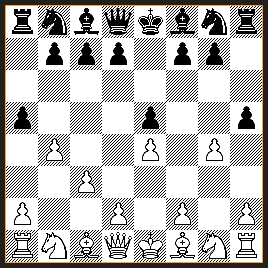 Today I received the first two bulletins for the Olympiad. Though they were much delayed, I was not impressed with the output: there are no photos in them and mistakes are numerous. For example, consider the following game:
Today I received the first two bulletins for the Olympiad. Though they were much delayed, I was not impressed with the output: there are no photos in them and mistakes are numerous. For example, consider the following game:
1 e4 e5 2 b4! White obviously wants to gain time after 2…Bxb4?? 3 c3, but Black is alert and comes with a brilliant counter-attack:
2…a5!! 3 c3 Seeing that White is stubborn and just won’t make any concessions on the queenside, Black decides to attack on the other wing:
3…h5!? This is an interesting idea, but should Black have foreseen White’s reply, he probably would have second thoughts about playing this aggressively. White called his bluff:
4 g4!! (See diagram at right.)
White eventually won in this game, which showed how gambits should be played. Alas, the rest of this wonderful encounter is missing. I assume that Black did not resign on move 4, although, being in his shoes, I might have done just that! Do not blame the players (White is a GM!) – this entertaining game was produced courtesy of those wonderful electronic boards. To please them we must not adjust pieces before the game and for them we have to restart our games occasionally. Looking at the example above, I am terrified even to think what kind of game they will produce, should somebody touch his or her pieces before the game starts! 🙂 These boards are bringing some fresh ideas in the opening. For example: 1 c4 e5 2 Nc3 d5!! 3 Nxd5 Nf6 4 Nxf6+, but despite Black’s innovative play, she lost. But who said that chess should be fair?! By the way, if you try any of these ideas in your local club and they do not work, don’t even think of suing me. I had little to do with this report – it was written by an electronic board connected to my PC!
More to follow tomorrow – stay tuned!
Day Five, 1st November 2000
In round 5 Germany beat Israel 3-1 and became a sole leader. That result was surprising, as Israel looks like a stronger team. However, in team events ratings do not mean that much. Germany is playing really well here, particularly on boards 3 and 4, where they score heavily. Russia had a good result too, beating Brazil 3¸-¸. Tomorrow Russia will meet Germany. Another surprise of the day was a poor performance of Hungary, which lost to India 1¸-2¸ (Kunte-Almasi 1-0; other games drawn). OK, India is not a bad team, but in the match Hungary was a clear favourite. England beat Yugoslavia 2¸-1¸, even though Nigel Short lost on board 1 to Damljanovic. So far England and USA do not look too impressively here, while Ukraine is getting closer to the leaders. Today Ponomariov beat Milov – as I predicted, this guy is the one to watch out for!
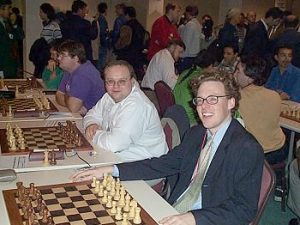
The Irish in Turkey: IM Mark Quinn, IM Mark Heidenfeld, Colm Daly and Sam Collins
Today Irish men’s team beat Wales 3-1, so we are on +2 now. That was a reasonable score, as our players had higher ratings on every board. Our women’s team lost 1-2 to Morocco, so now they are pretty much on the bottom of the list… 🙁
At left: The Irish in Turkey: IM Mark Quinn, IM Mark Heidenfeld, Colm Daly and Sam Collins
I did not play today, so in the afternoon I went to see the old city. It is very busy, with lots of people selling and buying stuff in the streets. I went to the Sophia Cathedral, which is beautiful inside – you can actually feel the history there! The weather is very nice here at the moment – sunny and quite warm (about +20 in the afternoon, I guess). This is in such a sharp contrast with the weather back in Dublin, that I am particularly glad that the Olympiad is in October-November – I am missing all the rain! 🙂
As I found out today, resting is actually more tiring than playing – first I walked a lot and then saw much more chess positions than I would normally do. So, I’ll keep this report short – more tomorrow!
Day Six, 2nd November 2000
Round 6 did not change the position of the leading group dramatically. Germany drew against Russia (all games were drawn) and remains the leader on 18¸ points. In round 7 Germany plays against Slovakia, which held Ukraine to a draw in round 6. Russia will meet Israel, which beat Spain 3-1 (on board one Gelfand beat Shirov). This is a very interesting match, which some people already called ‘Russia against the USSR’! :-). Indeed, Gelfand and Smirin are from Byelorussia, Avrukh is from Kazakhstan, Psakhis is from Russia, Sutovsky is from Azerbaijan, while Huzman is from Ukraine. As for other top matches, England drew against Denmark (all games drawn). This is already 3rd match when the Danes drew all their games. German and Danish teams have not lost a single game yet. Hungary beat Czech team 3-1, while the match Armenia – Bulgaria ended in a draw.
After six rounds the standing is as follows: 1. Germany – 18¸ points; 2. Russia – 17¸ points; 3. Slovakia – 17 points; 4-6. Hungary, Israel and Ukraine – 16¸ points; 7. Armenia – 16 points; 8-18. England, China, USA, Bulgaria, Netherlands, Georgia, Croatia, Denmark, Yugoslavia, India and Philippines – 15¸ points. In round 7 the key matches are: Germany-Slovakia, Russia-Israel and Hungary-Ukraine.
Ireland drew against Iraq, which was a bit disappointing. I won against a 2423-player, but we lost on board 2 and missed a clear win on board 3. Our lady’s team won 3-0, which improved their tournament position a lot. In round 7 Irish men’s team will play against Azerbaijan. This former Soviet State has a long chess tradition (Kasparov comes from there!), but here they have some of their best players missing, like, for example, 13-year old Teimur Rajabov (2475). Both teams have 13 points.
Here is my game from round 6: (Click here for Game Viewer)
A. Baburin (2590) – A. Sarsam (2423) D36
1 d4 Nf6 2 c4 e6 3 Nc3 d5 4 cxd5 exd5 5 Bg5 Be7 6 e3 c6 7 Qc2 Bg4
This is a rare move, but it’s not bad.
8 Bd3 Bh5!
Black rightly avoids 8…Nbd7?, which allows 9 h3!, and if 9…Bh5, then 10 f4!.
9 Nge2 Bg6 10 f3!?
This seems to be a new move (of course, I did not know any theory here!). I wanted to keep the option of 0ö0ö0 open. 10 0ö0 Na6 11 a3 Nc7 12 Nf4 0ö0 gave White nothing: 13 Na4 Bxd3 14 Nxd3 Ne4 15 Bxe7 Qxe7 16 Nac5 Nxc5 17 Qxc5 Rfe8 18 Qxe7 Rxe7= Drasko-Korzubov, Belgrade 1998. Also harmless is 10 Ng3 Na6 11 Bf5 Nh5 12 Bxe7 Qxe7 13 Nxh5 Bxh5 14 Qb3 Bg6 15 Bh3 Nb4 16 0ö0 Bc2 17 Qa3 0ö0 Furman-Kan, Moscow 1955.
10…Na6
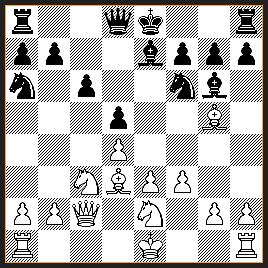
11 a3!
I believe that this is better than 11 Bxg6 hxg6 as White might be able to get his knight to f5. The drawback of the move played is that White should forget about 0ö0ö0 now, as …b7-b5-b4 could be a problem.
11…Bxd3
White already threatened to play e3-e4, so this move was forced.
12 Qxd3 Nh5 13 Bxe7 Qxe7 14 e4 Nf6 15 e5 Nd7 16 f4 Nc7
16…f6!? was worth considering.
17 0ö0 f6 18 Ng3 fxe5
Now Black cannot castle kingside, but 18…0ö0 19 Nf5 Qe6 20 Rae1 left White some initiative, while 18…g6? would be just bad in view of 19 e6 Nxe6 20 f5 gxf5 21 Nxf5, with attack.
19 fxe5 g6 20 b4 0ö0ö0 21 Nge2!?
I felt that I had to relocate the g3-knight, which was doing nothing on g3.
21…Kb8 22 Nf4 Nb6 23 b5 c5 24 a4
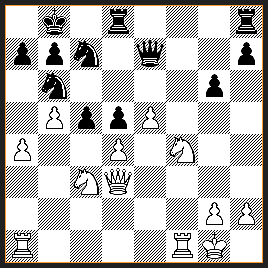
Here Black can choose 24…cxd4?! 25 Qxd4 g5 26 a5 Nc4 27 b6 gxf4 28 bxc7+ Qxc7 29 Nb5 and 24…g5 25 a5 Nc4 26 Nfxd5. The move, which he played, is also OK.
24…Nc4 25 a5!?
I also considered 25 Rae1 here, but it was tempting to leave the rook on a1, in case the queenside will be opened.
25…Nb2
I expected mainly 25…g5 26 Nfxd5 Nxd5 27 Nxd5 Rxd5 28 Qxc4 Rxd4 29 Qf7. In this line the advantages of the move a4-a5 are apparent, as White can play a5-a6, weakening the 7th rank.
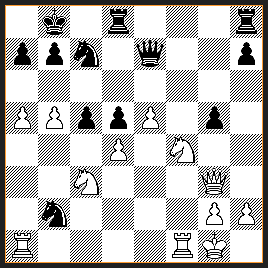
26 Qg3 g5
26…cxd4 27 b6 dxc3 28 bxc7+ Qxc7 29 Ne6 would have left White with an advantage too.
Here I considered 27 Nfxd5! Nxd5 28 Nxd5 Rxd5 29 e6+. Objectively this is very good for White, but playing in a team event I was reluctant to sacrifice a piece. Then Black would have a difficult choice: 29…Qc7?? loses after 30 e7 Re8 31 Rf8, while both 29…Kc8 and 29…Ka8 gives White a terrific attack after 30 a6!. The move, which I chose, is much safer, but gives away some of White’s advantage:
27 b6 gxf4 28 bxc7+ Qxc7 29 Qxf4 a6 30 e6!
Now the e-pawn can become very dangerous.
30…Rhe8
Better was 30…Qxf4 31 Rxf4 Rhe8.
31 Qxc7+ Kxc7 32 Rf7+ Kc6 33 Rb1 cxd4?
Better was 33…Nc4.
34 Ne2 Nc4 35 Nxd4+ Kc5 36 e7!
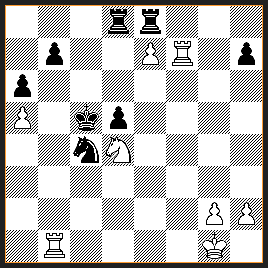
36…Rb8
Black had to play 36…Rd7! 37 Ne6+ Kc6 (not 37…Kd6? because of 38 Ng7!) 38 Nd8+ Kc7 39 Rxb7+ Kc8 40 Rxd7 Kxd7 41 Rxh7, although White retains better chances.
37 Ne6+ Kc6 38 Ng7 Nd6 39 Rf6! Kd7?! 40 Nxe8 Rxe8 41 Rb6 1ö0
Day Seven, 3rd November 2000
Today was a rest day at the Olympiad. Our team went to a boat trip on the Bosphorus. It was a great excursion – Istanbul looks lovely from the sea, with many beautiful houses on both banks of the Bosphorus. On the way back we went to an ancient castle, located on the European side of the Bosphorus. In the evening we went to a local restaurant (we are a little bit fed up with food in our hotel – it’s OK, but not too tasty). It was a great experience: there were hundreds of people sitting in open restaurants, enjoying local cuisine. The food was very tasty and not too expensive: between six of us we paid about $150, but we also had 2 bottles of wine and good few beers with the meal. In general, Turkey is not expensive – you can have kebab and a soft drink for $2, while a 7-8 km trip by taxi might cost you just $4. At the same time tourists are often milked, as you can easily end up paying almost $2 for a can of a soft drink or a cup of coffee, which is unfortunately the case in the playing hall. Anyway, Istanbul is making a very favourable impression on me!
More tomorrow – stay tuned!
Day Eight, 4th November 2000
After a day-off it was logical to see some hard-fought matches and this was indeed the case in round 7. Germany drew 2-2 against Slovakia and remained in the lead, as Russia also drew against Israel (all games drawn, but Svidler missed a win against Smirin). Hungary drew against Ukraine, while Armenia beat Denmark 3-1. Tough Danes finally lost some games and now only Germany has not lost a single game. There were some big results in this round, for example Switzerland crashed Chile 4-0. Netherlands beat Georgia 31/2-1/2, which a big surprise as Netherlands is seeded 9th, while Georgia is seeded 10th. Philippines won 21/2-11/2 against China, while England only drew against Croatia. USA also drew – against Yugoslavia: on board 1 Seirawan beat Damljanovic, but Nick de Firmian lost to Kovacevic. Nick is not having a good tournament here…
So, before round 8 Germany is leading on 201/2 points. Russia is in the second place with 191/2, while Netherlands, Armenia, Switzerland and Slovakia have 19 points. England and USA are on 171/2 points (equal 12th place).
Irish men’s team had a bad day, as we lost 1-3 to Azerbaijan. I drew with Black against a young IM, rated 2510. I stood slightly worse in the game, but gradually solved my problems. In the end I was a bit better, but unfortunately it was not enough. Irish women’s team did very well today, winning 21/2-1/2 against Zambia. As in round 6 they won 3-0, our ladies have improved their standing dramatically.
Day Nine, 5th November 2000.
Another bad day for our men’s team as we lost 1-3 to United Arab Emirates – a team, which is seeded below us. I had a big advantage after my opponent played the opening horribly, but when I made some mistakes, he started to play with a lot of energy. I had to defend most of the game, but held my position. So far my result is OK – I’ve played 6 games against average opposition of 2523 and scored 4 points, which equals to 2640 rating performance.
Our ladies had another good day, beating Iraq 2-1. They are now playing really well and I hope that they will keep winning.
On the top tables Germany was lucky against Netherlands and won 3-1. But luck may have a lot to do with the fact that Germany has a very good team spirit. So far in this respect they look better than any other team. Russia also won 3-1 – against Slovakia. Russians quickly drew on boards 1 and 3 with Black and scored with White (Morozevich and Sakaev won). Israel drew against Hungary, England drew against Poland, while USA beat Brazil 3-1. Armenia beat Switzerland 21/2-11/2, while Bulgaria crashed Croatia 31/2-1/2. Ukraine scored an even bigger victory against Philippines: 4-0, which elevated them very close to the leaders.
The standing before round 9 is: 1. Germany – 231/2; 2. Russia – 221/2; 3. Ukraine – 22. The key matches tomorrow are: Germany-Ukraine, Bulgaria-Russia, Armenia-Spain, Romania-Switzerland and USA-Israel. England plays against Iceland.
There were no organising problems in the past few days. The quality of the bulletin improved dramatically, as we now have a complete list of all players (with titles and ratings). I heard that some players have problems with stomach, some with a moderate flu, but this sort of thing can be expected at such a big event.
More news from Istanbul tomorrow – stay tuned!
Day Ten, 6th November 2000.
Finally our team broke our losing series, as we beat Qatar 21/2-11/2. The score could be event better, but I lost the game where I had a big advantage. At some point I could take a draw by a perpetual check, but I decided to play on. My judgement was correct, but the execution was poor – one bad move and I found myself losing the game, which I had played very well. Well, losing is a part of the profession… I will annotate that game tomorrow.
Our ladies won again – their 4th victory in a row! This is probably the longest winning streak our team ever had. They beat the team from South Africa 2-1.
The day was tough for leaders in men’s Olympiad as Germany lost to Ukraine – 11/2-21/2. Russia lost with the same score to Bulgaria, which becomes a bad tradition for the Russians, who also lost to Bulgarian in Elista (1998), Yerevan (1996) and Moscow (1994)! After 9 rounds Armenia and Germany are leading on 25 points, Ukraine is third with 241/2 points and then come Bulgaria and Russia on 24 points. Tomorrow the key matches are Armenia-Germany, Ukraine-Bulgaria and Russia-Romania.
In women’s Olympiad the standings are: 1. China – 21 points; 2. Georgia – 201/2 points; 3-4 Russia and Netherlands – 181/2 points; 5. Ukraine – 18 points. Today Ukraine plays against China, Georgia against Romania and Russia against Netherlands.
With 5 rounds remaining the competition gets tougher. By the way, I should mention the official site of the Olympiad – www.istanbulchessolympiad.com There you can find game scores, match results, etc.
In the evening most on the Irish team went for a drink. Both local beer and wine are not bad. There are lots of people at the Taksim Square (the area around which most teams stay) and it’s possible to find an open place at any time of the night. Actually, there are almost as many people around the Taksim Square at 2 in the morning as during the day – Istanbul keeps surprising us! Not everything is pleasant though – the city gets rather dirty in the end of a day. The streets are cleaned every night, but I wonder whether installing more bins could be a better solution. There is also a fare amount of hustling and begging in the streets.
More new from Istanbul will follow – come back tomorrow!
Day Eleven, 7th November 2000.
For the some the US presidential election may be the highlight of the day, for many people down in Istanbul it was the 10th round of the Olympiad! 🙂 Our team did really well, beating Cyprus Qatar 31/2-1/2. Playing White on board one, I offered a draw to GM Kotronias after 8 moves, as I felt pretty sick. Fortunately he did not mind a quick draw and so I retired to my hotel room…
Unfortunately, our ladies team lost to Mexico.
By the way, I would like to mentioned that the Irish teams received some sponsorship from an Internet company www.all-hotels.com This support is modest yet, but hopefully it will grow – the Irish chess badly needs something like this!
On the top tables Russia smashed Rumania 4-0 and jumped into the first place.
Russia. Other results from the top: Ukraine-Bulgaria 21/2-11/2, Hungary-USA 2-2 and Israel-Denmark 2-2.
After 10 rounds the standing is a follows: 1. Russia – 28 points
2. Germany – 271/2 points 3. Ukraine – 27 points 4. Armenia – 261/2 points 5-6. Hungary and Bulgaria – 251/2 points 7-9. Israel, USA and Bosnia – 241/2 points.
In women’s Olympiad the 10th round did not change much in the leading group: China beat Ukraine 2-1, while Georgia defeated Romania with the same score. Now it is a race between China and Georgia. With 4 rounds to go the standing is:
1. China – 23 points, 2. Georgia – 221/2 points, 3-4 Russia and Netherlands – 20 points.
So far I am playing reasonably well here, as even in the game I lost I actually played OK and only one serious error ruined my winning chances. Here I would to show this curious game:
M. Al-Modiahki (2502) – A. Baburin (2590) (View Game and notes in Game Viewer.)
1 e4 Nf6 2 e5 Nd5 3 d4 d6 4 c4 Nb6 5 exd6 exd6 6 Be3 Be7 7 Bd3
I think that such ‘simple’ development does not give White any advantage.
7…Nc6 8 Nf3 Nb4! 9 Be2 Bf5 10 Na3
Now White’s knight is pretty awkwardly placed on a3. 10…d5!
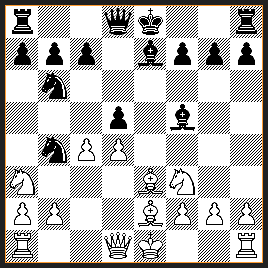
I felt that it was important to take away from White the possibility of d4-d5. Besides, Black does not have any other plan than to go …d5 at some point.
11 c5 Nd7 12 0ö0 0ö0 13 Qb3 a5 14 Rac1
White wants to play Nb1 and a2-a3, therefore Black must hurry up:
14…b6! 15 Nb5
This is an interesting idea. I expected 15 cxb6, when I was going to play 15…Nxb6; 15…c6 is also possible.
15…c6
After 15…bxc5 16 dxc5 c6 White would, of course, play 17 Nbd4.
16 Nd6 Bxd6
I also considered 16…Bg4 here, but then decided that it would be better to get rid of the d6-knight.
17 cxd6 c5!
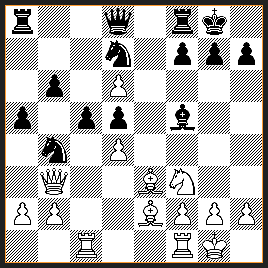
This move and the following line is the only way to justify 16…Bxd6.
18 dxc5 bxc5 19 Bxc5 Bc2!
The line 19…Nxc5 20 Rxc5 Qxd6 21 Rfc1 is not what I played 16…Bxd6 for!
20 Qc3
This is yet another interesting solution, although this sacrifice is not forced. The variation 20 Rxc2 Nxc2 21 Qxc2 Rc8 is better for Black, but the line 21 Qxd5! Rc8 22 Bd4 Nxd4 23 Qxd4 is OK for White. Probably it is objectively stronger than what he played in the game.
20…Rc8!
I guess White would be happy after 20…Nxa2 21 Qxc2 Nxc1 22 Rxc1 Rc8 23 Qf5.
21 Bxb4 Rxc3 22 Bxc3 Be4 23 Bd4! Nf6!?
23…Re8!? was interesting too, but I had a particular manoeuvre in mind:
24 Rc6 Nh5
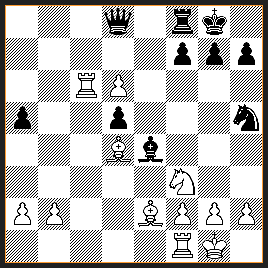
Black is trying to employ his knight. White must not allow the knight to f4, but this leads to weakening of his king.
25 g3! Qd7 26 Ne5 Here White offered a draw, but Black can and should play for a win. 26…Qh3 27 f3 Nxg3 28 hxg3 Qxg3+
29 Kh1 Qh3+ 30 Kg1 Qg3+ 31 Kh1 Bf5!
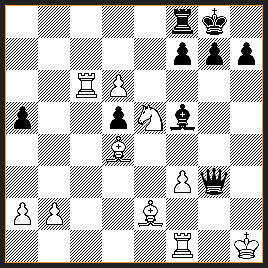
32 Ng4
Perhaps, better was 32 f4, but such a move is easier to suggest than to make! Black is still better after 32…Be4+ 33 Bf3! f6 34 Bxe4 dxe4 35 Rc7 e3 36 Rxg7+ Qxg7 37 Rg1 Qxg1+ 38 Kxg1 fxe5 39 Bxe5.
32…Qh4+ 33 Kg2 h5??
I saw 33…Re8!, but decided that 33…h5 was winning by force. I guess that subconsciously I was afraid that somewhere White would have d6-d7 with a tempo. 33…Re8! would have given Black a big, if not winning, advantage after 34 Bd1 h5 35 Bf2 Qg5 36 f4 Qxf4 37 Nh2. Now White comes up with a great shot:
34 Bf6!!
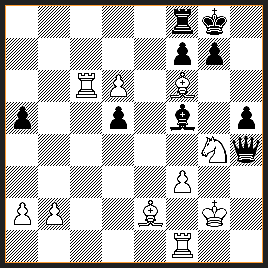
I saw the line 34 Rh1? Qg5 35 Bf6 Qg6!. When I considered 31…Bf5!, I saw the idea of 34 Bf6!! too, but that was just a passing thought, which unfortunately did not quite register in my mind. Otherwise I would have played 33…Re8 without any thinking.
34…gxf6 35 Rh1 Qg5??
Black had to play 35…Qxh1+ 36 Kxh1 hxg4 37 fxg4 Be4+ 38 Kg1 Rd8, although the ending is very unpleasant.
36 Rxh5 Qd2 37 Nh6+ Kg7 38 Nxf5+ Kg6 39 Ng3
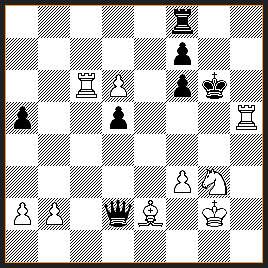 This knight is a fantastic worker! Now Black is lost.
This knight is a fantastic worker! Now Black is lost.
39…Re8 40 Kf1 d4
After 40…Rxe2 41 Nxe2 Kxh5 42 d7 the d-pawn is unstoppable.
41 d7 Rxe2 42 Rxf6+ Kg7 43 Nf5+ Kxf6 44 d8Q+ Kg6 45 Qg8+ Kf6 46 Qg7+ 1ö0
Come back tomorrow for my next report!
Day Twelve, 8th November 2000
11th round of the Olympiad saw some hard-fought matches. On the top tables the most popular score today was 21/2-11/2. With this score Russia defeated Urkaine, Bulgaria beat, Hungary outplayed Armenia 21/2-11/2 and USA won against Philippines 21/2-11/2. In the match Bosnia-Israel all games were drawn.
So, with 3 rounds to go the standing is as follows:
1 Russia – 301/2 points
2 Germany – 29 points
3 Ukraine – 281/2 points
4-6 Bulgaria, Hungary and Armenia – 28 points
7-8 USA and Netherlands – 27 points
The Irish men’s team played against Croatia, which was a bit unfortunate, as we were only on +2 and Croatia is a very powerful team. I played Black against GM Zdenko Kozul (2616). He is a very strong player and is particularly good with White, so before the game I sensed that it would be a serious test for my Queen’s Gambit Accepted. Indeed, I was in trouble in the opening, but both of us played rather badly and fortunately (for me!) my opponent committed more chess sins in the game than I did. Here is end of that game.
Zdenko Kozul (2616) – Alexander Baburin (2590)
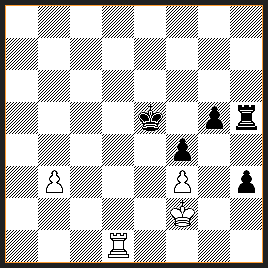 Position after 60 Rd1.
Position after 60 Rd1.
Here I had about 3 minutes to make the control move. I was going to play 60…h2 and if 61 Kg2, then 61… g4!, winning. Then I saw a ghost – the line 61 Rh1! Kd4 62 Kg2 Kc3?? 63 Rxh2 Rxh2+ 64 Kxh2 Kxb3 65 Kh3=. Of course, much better is 62…Ke3!, although the win is still not trivial. Yet, Black should succeed after 63 b4 Rh4! 64 b5 g4! 65 fxg4 Rxg4+ 66 Kh3 Rg6, as his pawns are well advanced, while the enemy pieces are badly placed. Anyway, seeing the crazy line with 62…Kc3?? I got a bit nervous and decided to play a less committal move:
60…Rh6? This is not bad, but even stronger was 60…Rh8!, so the rook would further away from White’s pawn, when Black plays …g4 and White gets the g-pawn.
61 Kg1 White could not play 61 b4 because of 61…Ra6. 61…h2+ 62 Kg2??
White had to play 62 Kh1. Then 62…Rh3? does not work – 63 Kg2 Rg3+ 64 Kf2! g4 65 fxg4 Rxb3 and here White has some chances. The point is that after 63 Kg2 Black cannot use his main tactical idea – 63…g4?? 64 fxg4, as there Black’s rook is hanging! Black thus has to play 62…Rh8!. Then 63 Rd2 allows 63…Rh3, so White should push the b-pawn: 63 b4. The following line is quite curious: 63…g4 64 fxg4 f3 65 b5 Kf4 66 b6 Kg3 67 b7 Re8 68 Rc1 f2 69 Rc3+ Kxg4 70 Rc4+ Kf3 71 Rc3+ Ke2 72 Rc2+ Ke3 73 Rc1 Kd2 74 Ra1 Re1+ 75 Kxh2 f1Q 76 Rxe1 Qf4+, winning or 76 b8Q Re2+ 77 Kg3 Rg2+ 78 Kh3 Qf3+ 79 Kh4 Qg4#.
In the game Black’s task was much easier:
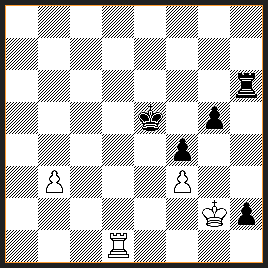
62…g4! 63 fxg4 h1Q+ As after 64 Rxh1 Black has 64…f3+ 65 Kg1 f2+ 66 Kg2 Rxh1, White resigned. 0—1
Unfortunately, we lost on all other boards in the match, so we are on only 50% after 11 rounds. Our ladies’ team had a bad day too, losing 1/2-21/2 to the United Arab Emirates. We have to console ourselves with that there is life after chess! 🙂
More to follow – stay tuned!
Day Thirteen, 9th November 2000
Today Russia strengthened its leading position greatly, as they crashed Armenia 3¸-¸. Its curious that in women’s event these two countries met as well (Russia won 3-0). Germany beat USA 3-1 and so it can still overtake Russia. With two rounds to go the standing is:
1 Russia – 34 points
2 Germany – 32 points
3-4 Ukraine and Hungary – 301/2 points
5-8 Bosnia, Israel, Bulgaria and England- 291/2 points
In women’s tournament China looks sure to take the gold, while Georgia is almost certain of getting the silver. The standing is:
1 China – 28 points
2 Georgia – 251/2 points
3 Russia – 24 points
Today I did not play and our men’s team won 4-0 against Albania! Maybe I should be rested more often?! I would not mind that actually, as I went to a Turkish bath (‘hamam’ in Turkish) today. I felt that it would be a shame to visit Istanbul and not to find out what those baths are. It was a great experience and I can only recommend it. Here is some info for you in case you’d like to know.
When you enter the bath, you are given a key to small room, where you can undress and leave your clothes. You also get a towel to put around your waist. Then you go to a hall with a roundly flat marble platform in the centre. There you can lie down. The platform is heated from the underneath, so it is pretty hot, particularly towards the centre. Otherwise the room is not hot, which is a sharp contrast with sauna or Russian bath. The platform is rather large and in the bath where I went, about 20 people could be accommodated on it. After 10-15 minutes I felt very relaxed. Later I got a massage. It started with being washed and scrapped. I was not too enthusiastic about being washed by somebody, but it was OK. By the way, the massage is done by a person of the same sex, so do not hold your breath here! 🙂 After that the masseur started a real work – at times I thought that he really wanted me to scream! He even found some ribs in my body – something, which I saw last time many years ago, before I sat down in front of my computer screen! 🙂 Anyway, I survived the massage and felt great afterwards – like I was born again (not that I remember the first time, though!). The whole thing took about 1 hour and cost $15 plus tips. That was in a fancy touristy place; local bath cost about $5 for the same service.
Now I feel that I saw something in Istanbul apart from chess – the trip down the Bosphorus, the Sophia and the baths. I’d like to see the Blue Masque and the bazaars, but this may requite a separate trip to Turkey. Well, maybe one day it will happen. By the way, there are quite players who came here to see the city and watch the Olympiad – I really envy those guys, as they get the best of the both worlds! This January I suddenly realised that I had never went to a tournament not to play. So, I decided to go to Wjik aan Zee and it was terrific!
Our ladies had another bad day, losing 1-2 to Mexico.
Day Fourteen, 10th November 2000
I wish I were rested again! After our great victory in the previous round we were paired against Estonia. I played horribly against Ehlvest and was never in the game really… We lost 1-3, but on board 2 mark Quinn won a nice game against GM Rychagov. Our ladies beat a team from Yemen.
On top tables Russia and England made 4 quick draws. England remains the only team, which has not lost a single match yet. Germany beat Bosnia and Herzegovina 21/2-11/2. Yet, with 11/2 gap between Russia and Germany, it looks unlikely that Russians will have troubles winning the event. Hungary has chances to succeed Germany in the second position, as they beat Netherlands 3-1.
Today’s round saw one unexpected result as Georgia crashed Bulgaria 31/2-1/2, which put the Georgian team the 5th place, while their opponents went to the 18th position. Today USA lost 11/2-21/2 to Cuba. It is hard to tell what is missing, but the American team is not playing well here.
Before the last round the standing is:
1 Russia – 36 points
2 Germany – 341/2 points
3 Hungary – 331/2 points
4 Ukraine – 321/2 points
5 Georgia – 32 points
In women’s event Russia narrowed the gap between itself and Georgia by beating Poland 3-0, while the Georgians won 21/2-1/2 against Kazakhstan. Before the last round the standing is as follows:
1 China – 301/2 points
2 Georgia – 28 points
3 Russia – 27 points
4-5 Ukraine, Netherlands and Yugoslavia – 24 points
Tonight is the night of a Bermuda Party at the Hilton Hotel. This traditional party, sponsored by the Bermuda team is a highlight of the social life at the Olympiads. I attended them in Moscow in 1994 and in Yerevan 1996. I heard that there was none in Elista in 1998, mainly because the Bermudan team was missing there too! Soon we’ll see how it is in Istanbul. More to follow – stay tuned!
Day Fifteen, 11th November 2000
Today was a free day at the Olympiad. Most people spent it recovering from the Bermuda party, which took place last night. I was there too, but survived without causing too much damage to my health, though beer was relatively cheap (about $1.5 per glass). I thought that the music was too loud, which made it hard to talk. As I am not really a dance fan, that was a serious blow for me. Yet, even those who like to dance had a tough day — in the beginning the music was mainly Turkish. Later western music prevailed, but the choice was poor. Anyway, it’s history now.
In the evening some on the Irish teams went to a restaurant, where the waiter tried to overcharge them heavily. As $150 extra between 6 people was very obvious, he failed miserably…
In the evening some players met (as usual) for a drink in the Taksim Square hotel, Yet, most of us did not stay long, as the following day the round would start at 10-00 in the morning. Saturday night is very busy in Istanbul. For the first time in my life I saw traffic jams at 1 o’clock in the morning!
We are lucky with the weather here — it’s relatively warm, without any rain. I heard that there were floods in Ireland recently. So, playing in a chess Olympiad could provide a good escape sometimes! I hope to see the Blue Masque and the bazaars, but fear that I will not have time or energy. Most likely both — Olympiads are quite tiring.
I spend a lot of time in the Internet café today. The one, which I liked most during the tournament, was a bit pricey (about $3 per hour), but had excellent connection. Some of the others had painfully slow connection, but pool tables to make up for it – you click on something, play a few shots and then the site appears on the screen! 🙂 Yet, as I am poor at pool, I preferred higher Net speed!
More later — stay tuned!
Day Sixteen, 12th November 2000
The tournament is over! Russia duely won the event by drawing all 4 games against Georgia very quickly. It was interesting to see how Germany would do against England. Many believed that Germany could lose and let Hungary to overtake them. Yet, Hungary drew 2-2 against Slovenia, while Germany beat England 21/2-11/2. On board 3 Dautov defeated Hodgson. Both Dautov and Yusupov had fantastic results here. Other results from the last round:
Ukraine-Bosnia 3-1, Israel-Yugoslavia 3-1, India beat Cuba 21/2-11/2. Ukraine caught up with Hungary and took the bronze on a tiebreak.
The final standing is as follows:
1 Russia – 38 points
2 Germany – 37 points
3 Ukraine – 351/2 points
4 Hungary – 351/2 points
5 Israel – 341/2 points
6 Georgia – 34 points
7-13 England, India, China, Switzerland, Uzbekistan, Slovenia and Macedonia – 33 points. One of the main surprises of the Olympiad is a very poor result of the US team, which usually competes for gold. This time it finished only 26th…
Ireland beat Chile 21/2-11/2 and finished on +3 — our best result in Olympiads so far. I played a decent game in the last round:
A. Baburin (2590) — J. Egger (2433) Online Game Viewer
1 d4 Nf6 2 c4 c6 3 Nf3 d5 4 e3 Bf5 5 Nc3 e6 6 Nh4 Bg4 7 Qb3 This line is currently rather popular. White often gets more space and two bishops, which is not too bad! 7·Qb6 8 h3 Bh5 9 g4 Bg6 10 c5 Qc7 11 Nxg6 hxg6 12 g5 Ng8 (D)
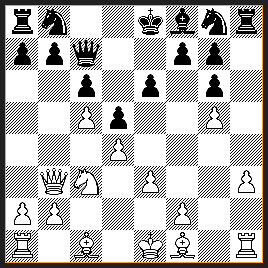
On this move my opponent spent 42 minutes, which is very impractical. The move itself is fine – Black wants to relocate this piece to f5, while leaving the d7-square for the other knight. However, it had to be played much faster! Also possible was 12…Nfd7.
13 e4 Nd7
Better was 13…Rh4, as in the game Dreev-Huebner, Essen 2000. Still, after 14 exd5 exd5 15 Ne2! Na6 16 Qg3! Rh8 17 Bf4 Qa5+ 18 Bd2 Qc7 19 h4 Ne7 20 Bh3 Nf5 21 Bxf5 gxf5 22 Bf4 Qa5+ 23 Kf1 Be7 24 g6! White seized the initiative and eventually won.
14 exd5 exd5 15 Ne2! White’s dark-squared bishop might become a poor creature, so White must bring it out to f4. 15…Ne7 I was going to meet 15…Rh4 with 16 Qg3 Qxg3 17 fxg3 when White again can control the f5-square with a pawn.
16 Bf4 Qa5+ 17 Bd2 Qc7 18 0—0—0 b6?! Better was 18…0—0—0. 19 Bf4 Qb7 20 h4! (D)
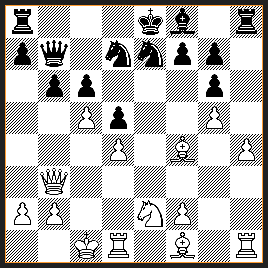
White takes away the h4-square from the enemy rook and gives more space for manoeuvring to his own rook.
20…0—0—0 21 cxb6 Qxb6 21…axb6 would be safer.
22 Qc2! Nf5 23 Rh3! This rook lift highlights Black’s weaknesses on the queenside. Now we can see the benefits of 20 h4!.
23…Bd6 24 Rc3! Nb8? Better was 24…Kc7, although after 25 Bg2 White has a great position. 25 Bh3! (D)
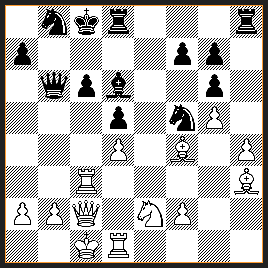
Now White is winning, as Black cannot defend all his numerous weaknesses.
25…Bxf4+ 26 Nxf4 Rxh4 27 Bxf5+ gxf5 28 Qxf5+ Rd7 29 Nxd5 Here Black played 29…Qb5, but his flag fell. 1—0
My overall result was +4-2=5 against 2530 opposition, which was slightly above my expected result. I was a bit unlucky to lose against Al-Modiahki in the game where I was winning, but generally I was happy enough with my play in the tournament.
There were 126 teams competing in the men’s event. This is the biggest turnout at any chess Olympiad so far. As for individual results, Alexander Morozevich received a trophy as the player who showed the highest rating performance in Istanbul. On board 1 the gold medal went to GM Utut Adianto of Indonesia; on board 2 GM Ruslan Ponomariov of Ukraine won the gold medal. On board 3 the winner was GM Dragoljub Jacimovic of Macedonia, on board 4 – GM Ashot Anastasian from Armenia. 17-year old Ponomariov had a very good result and his current rating must be close to 2680! Watch out for this guy in India!
In the women’s event the final results were as follows:
1 China – 32 points
2 Georgia -31 points
3 Russia – 281/2 points
4 Ukraine – 27 points
5 Yugoslavia – 26 points
6 Netherlands – 251/2 points
In the women’s event the best individual results were: board 1 – Viktoria Cmilyte, from Lithuania; board 2 – Zhu Chen from China; board 3 – Nino Khurtsidze from Georgia; reserve player – Zahira El Ghaby, of Morocco.
Irish women’s team finished well, winning their last 2 matches and coming 61st.
Some conclusions. In my opinion, the Olympiad was well organised and both local organisers and FIDE deserve credit for it! OK, there were some problems at the start (with electronic board and bulletins), but they were quickly solved. The organisers even insisted on replacing bulletins 1-3 (full of mistakes), which they indeed exchanged! The accommodation was good, transport excellent and food was reasonable — it was never bad (as it was sometimes in Moscow in 1994 or in Yerevan in 1996) and at times it was fine. The playing hall was not perfect (too stuffy), but at least you could see both events in the same hall. Istanbul is a very interesting city to visit and I hope that I will come back here again as a tourist – remember hamam! 🙂
Hopefully Chess Olympiads will not disappear even if chess will become an Olympic sport (which isn’t too likely to happen soon anyway!). Chess Olympiads have definite cultural importance and there is more to them than just tough struggle among top chess nations. On this note I am finishing my report. For more information on the Olympiad please refer to its official Web site: www.istanbulchessolympiad.com, which is very informative.
What is next? If you enjoyed my reports, do come back to Grandmaster Square — to have a look at some games or read some stories. As in the end of November I will go to New Delhi for the FIDE World Championship, expect to see my Indian Diary here!
With best regards,
Alex Baburin.



